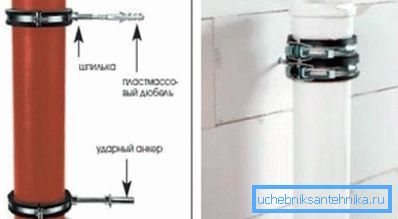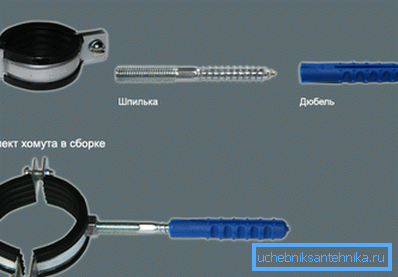Pvc sewer pipes: the entire installation sequence
The system of drainage to special septic tanks is practically the most important communication when it comes to comfortable living. In the course of operation, the water used for domestic needs is discharged and other waste is removed. Therefore, after the construction of a private house, the topic of how to collect sewer pipes becomes relevant.

The advantages of PVC elements
Immediately before the installation work will have to make a choice in favor of a material, preferring the most appropriate of them.
Sewer pipes made of polyvinyl chloride are particularly popular, which is explained by the impressive set of positive qualities, which are proposed to be considered below.
- The low price allows you to buy products to consumers of different segments of the population.
- Excellent resistance to chemical and mechanical influences makes it possible to exploit elements for decades.
- A simple installation of fragments of the system allows for installation independently.
- The light weight of the products greatly simplifies transportation and installation.
- Resistance to biological influences allows you to avoid the rapid spread of microorganisms in the system.

Reference! Polyvinyl chloride is a thermoplastic polymer produced synthetically. By production of elements stabilizers and special additives for improvement of characteristics are usually added to it.
Selection of suitable products
In the process of purchasing, it is necessary to choose the right product, otherwise it is impossible to guarantee the integrity of the system. Depending on the location of the system distinguish external and internal sewer pipes. You can distinguish them directly by color.
Orange elements are used, as a rule, for outdoor communication devices. They have a multi-layer structure, and therefore are able to successfully withstand the pressure of the soil. The wall thickness of such products is usually exactly 3 mm.

As for the internal analogues, gray elements are mainly installed for the self-flowing system in the room. They have a smaller margin of safety, as they have only one layer 2.7 mm thick. Inside, the sewer pipes are fixed to the ceiling or wall.
Assembly work
Although the installation of products for the effluent system is considered fairly simple, in any case, the basic rules and useful recommendations that will help simplify assembly should be studied. Only a well-written instruction can teach a novice master, therefore, further information will be presented directly by points.
Preliminary calculations
In order for the system to function efficiently, the diameter of the elements must be properly selected. Only in this situation will it be possible to avoid blockages and other problems with sewage. The table below lists the minimum allowable dimensions for basic units.

| Plumbing devices | Minimum diameter in millimeters |
| Bidet and sink | 32 |
| Shower and bath | 50 |
| Drain for multiple appliances | 75 |
| Main riser and toilet | 100 |
General provisions
- All sockets of components and fittings should be directed in the direction of the movement of effluent. Only with this option, the probability of leakage is reduced to a minimum.
- Shortening of additional parts and joints is not allowed. Do not install pipes with cracks and chips.
- The main sewage pipes must be attached to the side planes or the ceiling, as there is a risk of deformation of the products.
- To the riser, you must make a slope of at least i = 0.02. That is, one edge is set 2 cm higher.
- It is forbidden to install a tap when moving to a horizontal position at an angle of 90 degrees.
Component docking
Most often, the connection of sewer pipes is carried out with the help of special sockets at the ends. Such elements have rubber rings for sealing docking points.
Thanks to this, it is possible to ensure a high tightness of the sewage system.

- First of all, the bell of the product being stacked is cleaned of possible contamination.. The quality of the sealing ring in the inner part is checked.
- Rubber gasket carefully lubricated with silicone. After applying the composition on the surface should not be observed extraneous compounds.
- Two pipes are matched so that the axes coincide with each other.. Connection is made on a special label. Scrap can be used as an auxiliary lever.
Note! When laying the sewage pipes with their own hands, you need to pay special attention to the quality of the connections. Too deep arrangement of elements in the socket is also in danger.
Commit commit
It is imperative that the sewer pipes be fixed to a wall or any other stable surface. If this is neglected, then the system may lose tightness over time, which means it will have to reassemble the elements.

Fixation is carried out with the help of special clamps, which enclose the individual fragments around. The design of the fastener implies the presence of a screw or anchoring device. By means of such product reliable fastening to any surface is provided.
An important role is played by the correct location of fasteners. Fixation is usually done in places where there are branches, bends and connections of individual elements. To make accurate calculations, you must first draw the general scheme of the waste system.
When installing, the distance between the clamps should not exceed 1.5-2 m. With a larger step, sagging of the elements is possible, which can eventually lead to serious leaks at the joints. Fasteners should be carefully fixed in the carrier material, then the service life of the communication system will be measured for decades.

During the installation, it is desirable to alternate floating and rigid clamps. However, the last of them must be present at least in the central part of the pipeline.
Final part
After reading the above information, each newcomer must understand how the PVC sewer pipes are installed in residential buildings, as well as their advantages over other analogues.
Additional information that allows you to get a visual idea of the installation process of elements for the waste system is in the video in this article.